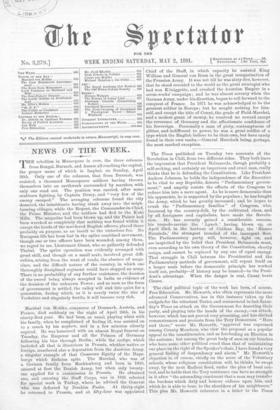The Times published on Tuesday two accounts of the Revolution
in Chili, from two different sides. They both leave the impression that President Balmaceda, though probably a self-seeking, and certainly an imperious and cruel man, really thinks that he is defending the Constitution. Like President Andrew Johnson, he holds the independence of the Executive to be vital to any Republic, detests "Parliamentary govern- ment," and angrily resists the efforts of the Congress to reduce him into a mere agent. As he is more democratic than his opponents, he is supported by the populace; he has bought the Army, which he has greatly increased; and he hopes to crush the "Parliamentary families" of Congress, who, favoured by the country-folk, by the cultivated class, and by all foreigners and capitalists, have made the Revolu- tion. He has recently gained a considerable success, his torpedo-carrier the 'Lynch' having blown up, on April 23rd, in the harbour of Caldera Bay, the Blanco Encalada,' the strongest ironclad of the insurgent fleet. The Parliamentary party will, however, fight on, and are inspirited by the belief that President Balmaceds, must, even according to his own theory of the Constitution, shortly resign, and cannot be replaced by any one of equal energy. That struggle in Chili between the Presidential and the Parliamentary methods of government, will repeat itself on a larger scale before the democratic principle has worked itself out, probably—if history may be trusted—to the Presi- dent's advantage. When the danger is real, Caesar, beats Cicero.






































